Saudi Arabia Backs Elon Musk’s xAI With Data Center Deal

© Kenny Holston/The New York Times

© Kenny Holston/The New York Times

© Kenny Holston/The New York Times

© Caroline Gutman for The New York Times

© Meron Menghistab for The New York Times

© Peter Dejong/Associated Press

© Jessica Rinaldi/The Boston Globe, via Getty Images

中央社引述南早:“在中国「小红书」上可见到数十名用户透过短片表示,他们所属的党政机关要求他们取消赴日本旅游”。
中央社19日引述香港南华早报的报导,日本首相高市早苗「台湾有事」说引发中日争端持续升级,且未见缓和迹象之际,数名中国国企员工透露,尽管事前已被批准,他们近日纷纷被公司要求取消近期前往日本旅游的计划。
湖北武汉一家国企的工程师向南华早报透露,他在18日接到一通意想不到的电话,来电的是他所属公司的行政部门人员,对方敦促他取消即将到来的赴日本休假行程。
报导提到,这名武汉国企工程师和许多中国国企员工一样,必须获得公司批准才能出国旅行。而他的出国申请早在10月就已获得批准,原定11月底飞往大阪旅游。但随着日中关系日益紧张,他不得不向旅行社取消了整个行程。经过协商,旅行社退还了机票和住宿费用,但签证费没有退。
赴日旅游被取消,这名工程师说,他还在考虑如何利用空出来的假期,可能改去中国其他地方「国内游」。
去程机票和饭店白花了
北京一家公立医院的男护士表示,他在11月初向医院申请到日本旅游。但中国文旅部发布日本的旅游警示后,医院主管昨天便以此为理由,要求他取消原定这个周末出发的日本旅游行程。
这名月薪仅人民币4000余元的男护士说,他是透过国外的线上旅游平台预定赴日机票和饭店,总共花了近6000元人民币,这导致大部分预订都无法退款,只剩下回程机票应该可以退款,去程机票和饭店就白花了,这对他无疑是沉重打击。
他坦承,自己正在考虑未经许可就偷偷去日本,但如果被医院主管发现,就太冒险了。
北京1名国营科研机构员工也表示,他同样面临取消12月日本行的压力,而他在大约1个月前就计划去日本休年假了。他的主管虽然没有明确表示完全不允许他去日本,却搁置了他的出国申请,实际上意味着上级不想让他去日本。
相较于前述的男护士,这名国营科研机构员工比较幸运,因为他预订的机票是提供退款的中国籍航空公司,且经过交涉,日本的饭店也全额退还了他的预订费用。至于空出来的假期,他表示还不确定,可能考虑前往其他目的地,但由于签证问题,这个出国旅游计划很可能要搁置了。
报导提到,这两天,在中国短影音平台「小红书」上可见到数十名用户透过短片表示,他们所属的党政机关要求他们取消赴日本旅游。
高市早苗「台湾有事」说引发中国强烈反弹后,中方以安全疑虑为由,建议公民近期避免前往日本;多家中国大型旅行社随即暂停销售日本旅游行程;而中国航空业者也相继宣布,将为年底前飞往日本的机票提供全额退款。
在日中这场风波爆发前,由于日圆疲软,日本旅游成本越来越低,中国赴日游客人数一直居高不下。

 @zinkevich_igor
@zinkevich_igorNine people have been killed in Russian strikes on Ukraine overnight, Ukraine's president Volodymyr Zelensky has said.
Russia launched more than 470 drones and 47 missiles in the "brazen attack", he wrote in a post on Telegram.
Three districts of Ukraine's second city, Kharkiv, were hit by a massive drone attack which injured more than 30 people, including children. Photos posted online showed buildings and cars ablaze.
Power cuts are affecting a number of regions across the country, Ukraine's energy ministry said.
This breaking news story is being updated and more details will be published shortly. Please refresh the page for the fullest version.
You can receive Breaking News on a smartphone or tablet via the BBC News App. You can also follow @BBCBreaking on X to get the latest alerts.

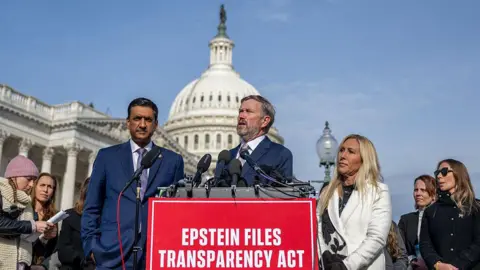 Getty Images
Getty ImagesBoth chambers of Congress agreed to order the US justice department to release its files on sex offender financier Jeffrey Epstein.
The House of Representatives overwhelming approved the measure in a 427-1 vote and the Senate unanimously fast-tracked it without a formal vote.
The moves come just days after President Donald Trump reversed his position and urged Congress to vote to disclose the records following public pushback from many of his supporters.
Last week, Trump and his ties to Epstein were thrust back into the headlines after more than 20,000 pages of documents - some mentioning the president - were released. The White House denied any wrongdoing.
Republican Clay Higgins, of Louisiana, was the sole House objector and cited his concern about “innocent people being hurt” with the release of the information.
Trump’s reversal from attacking those on Capitol Hill who wanted the files released to saying there was “nothing to hide” surprised some in Washington.
The Republican congressional leadership was caught off guard after aligning their message with the president for the past few weeks and opposing the release.
House Speaker Mike Johnson had repeatedly called the push to release the Epstein files a "Democrat hoax".
On Tuesday, he voted in support of release.
The measure had been expected to take a few days to reach the US Senate, but after the resounding afternoon vote in the House, the timeline quickly sped up.
Senate Minority Leader Chuck Schumer brought up the bill on the floor of the Senate under a procedure called unanimous consent. Because no one objected, there was no debate and no amendments added to the bill.
It will head from the Senate to the president‘s desk, where he is expected to sign it into law.
A congressional vote was not required to release the files - Trump could have ordered the release on his own.
The bill requires Attorney General Pam Bondi to release “all unclassified records, documents, communications, and investigative materials” related to Epstein and his co-conspirator Ghislaine Maxwell no later than 30 days after the law is enacted.
Those materials include internal justice department communications, flight logs and people and entities connected to Epstein.
But the bill also gives Bondi the power to withhold information that would jeopardise any active federal investigation or identifies any victims.
Epstein, a financier, was found dead in his New York prison cell in 2019 in what a coroner ruled was a suicide.
He was being held on charges of sex trafficking, having previously been convicted of soliciting prostitution from a minor in 2008.
During two criminal investigations into Epstein, thousands of documents were gathered, including transcripts of interviews with victims and witnesses.
Trump and Epstein previously socialised in similar circles, but the president said he cut ties with Epstein many years ago, before his 2008 conviction. The president also said he was unaware of Epstein’s criminal activity.
Last week, Democrats on the House Oversight Committee published three email chains, including correspondence between Epstein and Maxwell, who is currently serving a 20-year prison sentence for sex trafficking.
Some of those make mention of Trump, including one email, sent in 2011, in which Epstein wrote to Maxwell: “I want you to realize that that dog that hasn’t barked is Trump.. [VICTIM] spent hours at my house with him.”
The White House said last week that the victim referenced in the email was prominent Epstein accuser Virginia Giuffre.
Giuffre, who died in April, has said that she never saw Trump participate in any abuse and there is no implication of any wrongdoing by Trump in the emails.
Trump has consistently denied any wrongdoing in relation to Epstein. White House Press Secretary Karoline Leavitt said the emails were "selectively leaked" by House Democrats to "liberal media to create a fake narrative to smear President Trump".
The push for the release of the investigative files held by the Department of Justice was led by Republican Thomas Massie, a Kentucky congressman who sometimes dissents from his party, and Democrat Ro Khanna, a California congressman, both of whom introduced the legislation.
Massie has faced criticism from Trump for his push to release the files, but has stood firm.
“In 2030, he’s not going to be the president,” Massie said to ABC News over the weekend. He added that fellow Republicans who voted against release "will have voted to protect paedophiles”.
Another Republican who has pushed for the release of the files is House Representative Marjorie Taylor Greene. She had been a staunch supporter of Trump before the two fell out over the issue, with the president now calling her a "traitor".
At a news conference earlier in the day on Tuesday, Greene said she is speaking up on behalf of Epstein's survivors. She also called out Trump directly.
"Let me tell you what a traitor is. A traitor is an American that serves foreign countries and themselves; a patriot is an American that serves the United States of America and Americans like the women standing behind me," Greene said.
She said that row over Epstein has been one of the "most destructive things" to Trump's Make America Great Again movement since his election in 2016.
Survivors of Epstein’s abuse also spoke at the news conference, urging lawmakers to release the files and pushing Trump to do the same.
Epstein survivor Annie Farmer said that keeping the files under wraps amounted to “institutional betrayal”.
“Because these crimes were not properly investigated, so many more girls and women were harmed,” Ms Farmer said.

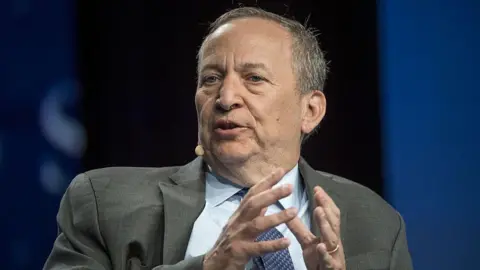 Getty Images
Getty ImagesFormer US treasury secretary Larry Summers is stepping down from the board at OpenAI, a week after a tranche of emails between him and late convicted sex offender Jeffrey Epstein was released.
Summers said in a statement to the BBC that he was "grateful for the opportunity to have served, excited about the potential of the company, and look forward to following their progress".
Summers, who was also once the president of Harvard University, said on Monday that he would be stepping back from public commitments over his ties to Epstein.
The recently released emails showed Summers communicated with Epstein until the day before Epstein's 2019 arrest for the alleged sex trafficking of minors.
In a statement, the artificial intelligence company said it respected Summers' decision to resign.
"We appreciate his many contributions and the perspective he brought to the Board," OpenAI said.
The news comes after both chambers of Congress agreed on Tuesday to pass a measure to require the US justice department to release its files on Epstein.
The measure will then head to the desk of US President Donald Trump for approval. He has said he plans to sign the bill, after reversing his position on the issue following pushback from his supporters.
A batch of Epstein-related emails released by the House Oversight Committee last week mentioned a number of high-profile figures in the financier's former circle, without indicating any legal wrongdoing by those figures.
The emails indicated that Summers and Epstein dined together frequently, with Epstein often trying to connect Summers to prominent global figures.
After the emails were shared with the public, Summers said he took "full responsibility for my misguided decision to continue communicating with Mr Epstein".
He added that he wanted "to rebuild trust and repair relationships with the people closest to me".
Summers held senior posts under two Democratic presidents; serving as treasury secretary under Bill Clinton, and as director of the National Economic Council under Barack Obama.
He led Harvard from 2001 to 2006 and remains a professor there. When announcing his step-down from public commitments earlier on Monday, he said he would continue his teaching commitments.
Following Summers' announcement on Monday, the Center for American Progress, a liberal think tank in Washington where Summers was a senior fellow, confirmed that Summers was no longer affiliated with the organisation.
Summers joined the board of OpenAI, which makes ChatGPT, in 2023 - following a failed attempt to oust its chief executive Sam Altman.

 AFP via Getty Images
AFP via Getty ImagesThe Kenyan authorities paid a network of trolls to threaten and intimidate young protesters during recent anti-government demonstrations, Amnesty International has said.
A new report by the human rights organisation said government agencies also employed surveillance and disinformation to target organisers of the mass protests, which swept Kenya across 2024 and 2025.
The demonstrations were driven largely by "Gen Z" activists who used social media platforms to mobilise.
In response to Amnesty's report, Kenya's interior minister said the government "does not sanction harassment or violence against any citizen".
But Amnesty said it had uncovered a campaign to "silence and suppress" the protesters.
Young women and LGBT+ activists were disproportionately targeted, with misogynistic and homophobic comment, as well as AI-generated pornographic images, the report said.
The BBC has approached the government for further comment.
One activist told Amnesty: "I had people coming into my inbox and telling me: 'You will die and leave your kids. We will come and attack you'.
"I even had to change my child's school. Someone sent me my child's name, the age... the school bus number plate. They told me: 'If you continue doing what you're doing then we will take care of this child for you'."
The report features a man who said he was part of a team paid between 25,000 and 50,000 Kenyan shillings (about $190-$390; £145-£300) per day to amplify government messaging and drown out trending protest hashtags on social media platform X.
As well as digital abuse, the authorities have also been accused of carrying out a brutal crackdown on the protests.
More than 100 people died, rights groups say, when police clashed with protesters during two waves of demonstrations - one in 2024 and one in 2025.
The authorities were also accused of arbitrary arrests, enforced disappearances and using lethal force against the protesters.
The government accepted there had been some case of excessive force by police, but also defended the security forces in other instances.
The demonstrations railed against issues such as proposed tax rises, increasing femicide and corruption.
Amnesty chief Agnès Callamard said the organisation's report "clearly demonstrates widespread and coordinated tactics on digital platforms to silence and suppress protests by young activists".
"Our research also proves that these campaigns are driven by state-sponsored trolls, individuals and networks paid to promote pro-government messages and dominate Kenya's daily trends on X," she added.
Kenya's Interior Minister Kipchumba Murkomen said: "The government of Kenya does not sanction harassment, or violence against any citizen... any officer implicated in unlawful conduct bears individual responsibility and is subject to investigation and sanction."
Amnesty also raised concerns about unlawful state surveillance, including allegations - denied by Kenya's largest telecom provider, Safaricom - that authorities used mobile data to monitor protest leaders.

 Getty Images/BBC
Getty Images/BBCGo to BBCAfrica.com for more news from the African continent.
Follow us on Twitter @BBCAfrica, on Facebook at BBC Africa or on Instagram at bbcafrica

 Yonhap News
Yonhap NewsA South Korean passenger ferry carrying 246 passengers and 21 crew has run aground on rocks off the country's south-east coast.
The Queen Jenuvia 2 is stuck on a reef and unable to move, but there is currently no risk of sinking or capsizing, according to the Coast Guard. People are currently being moved to patrol boats, it said.
The accident happened near Jangsan Island in Sinan County on Wednesday evening local time. The vessel ran aground on rocks near the uninhabited island of Jogdo.
Local media reported that five people sustained minor injuries from the impact of the grounding, but there have been no other casualties.
South Korean Prime Minister Kim Min-seok has ordered all available vessels to be mobilised to rescue the ferry.
"We have confirmed that there is currently no flooding. We are transferring passengers to patrol boats and moving them to a safe location," a Coast Guard official said, Chosun Ilbo newspaper reports.
The Coast Guard plans to move the vessel ashore at high tide.
The ferry was travelling to the port city of Mokpo after departing from the resort island of Jeju, carrying 246 passengers and 21 crew members, the Coast Guard.
The area is near the site of the sinking of the Sewol ferry in 2014 that killed more than 300 people, mostly school children heading for a school trip.

© The New York Times

(德国之声中文网)梅尔茨(又译默茨)在结束了短暂的巴西之行回到柏林几天后,出席了一场经济界人士的会议。他在发言时貌似闲谈地讲到,在从巴西返回时他曾问几位随行的德国记者,“你们当中有谁愿意留在这里?——没有一个人举手,”梅尔茨说,“所有人都很高兴,能从我们之前呆的那个地方,在周五夜里踏上返回德国的归途。”他认为德国是“世界上最美的国家之一”。
他所说的“那个地方”就是本次联合国气候峰会的举办地,巴西城市贝伦(Belém)。即便按照巴西的标准,这座位于亚马逊流域的城市也算得上贫穷,有不少破败的房屋、街道和贫民区。
巴西总统卢拉选择在这里举办联合国气候峰会,也是为了让全世界关注亚马逊流域的气候危机,同时凸显这座拥有数百万人口的大都市所面临的严峻社会现实。

傲慢与偏见
德国总理的言辞让卢拉很不以为然,他回应表示,很可惜梅尔茨在贝伦时没有去酒吧,没去跳舞和品尝当地的风味美食,“否则他会发现,若论生活品质,柏林赶不上帕拉州(Pará)和贝伦市的十分之一。”卢拉接着说,所有人都知道,这座城市很贫穷,但是“世界上没有什么地方有如此慷慨好客的人民”。
多家巴西媒体报道了德国总理的这番言论。新闻门户网站“Diário do Centro do Mundo”称梅尔茨做了一个“没羞没臊的比较”。贝伦的市长诺曼多(Igor Normando)也批评梅尔茨的说法“拙劣、傲慢、充满偏见”。
里约热内卢市长帕埃斯(Eduardo Paes)更是在X网站上发帖称,梅尔茨“不如”他在帕拉州的朋友们“那么有礼貌”,并给梅尔茨留言:“希特勒之子!混蛋!纳粹!”他随后删除了该帖子,并改写道:“这是我今天发泄情绪的方式。外交部请保持冷静。巴西和德国的友谊万岁。”
在梅尔茨的Instagram账号的发帖下,有很多人写下“请尊重巴西”之类的留言、并粘贴上大量的巴西国旗。

在野党要求梅尔茨道歉
德国左翼党在联邦议院的气候公正事务发言人博克(Violetta Bock)要求总理道歉。“梅尔茨关于巴西的言论缺乏尊重、居高临下,而且带有偏见。这让德国在国际舞台上颜面尽失。人们会认为,他像特朗普一样,试图转移人们对德国在气候保护方面缺乏承诺的注意力。”
绿色和平组织执行主任马丁·凯泽(Martin Kaiser)对此表示赞同。“梅尔茨必须向贝伦人民道歉,”他说,梅尔茨显然没有时间去体验贝伦人民的热情好客,而贝伦人民正生活在全球气候危机的临界点之一。“总理这样做也冒犯了卢拉总统,世界气候大会正是在卢拉总统的倡议下于贝伦召开的,世界各国可以在这里亲眼目睹热带雨林的壮丽景色和脆弱之处。”
在此背景下,本周仍在巴西参加气候峰会的德国环境部长施耐德(Carsten Schneider)不得不高调表态。他公开称赞贝伦是一座“了不起的城市”。“我在这里看到了高涨的建设热情、友善的人民,但也看到了许多贫困现象。”这位社民党籍的部长表示:“这个地方不仅凸显了热带雨林的重要性,也促使国际社会关注其社会问题、把气候问题和社会问题结合起来思考。”
他重申,德国政府将履行承诺,为气候保护项目继续向巴西提供资金援助。施耐德还在社交媒体发帖称,很遗憾在气候大会日程结束后他不能在贝伦多呆几天。
DW中文有Instagram!欢迎搜寻dw.chinese,看更多深入浅出的图文与影音报道。
© 2025年德国之声版权声明:本文所有内容受到著作权法保护,如无德国之声特别授权,不得擅自使用。任何不当行为都将导致追偿,并受到刑事追究。

法国斯特拉斯堡美术馆开幕于2025年11月7日到2026年4月27日举行著名动物摄影师文森特·穆尼耶(Vincent Munier)举行题为生命之光(Lumières sur le vivant)艺术展。在巴西举行Cop30之际,人类社会如何负责保护自然和动物之美尤为重要。
艺术与文化助理安妮·米斯特勒(Anne Mistler)表示:“我觉得本次摄影美得令人难以置信,感人至深,充满了诗意和幽默。聚焦于我们平时忽略的事物,我们偶尔也会瞥见某些动物的身影。
穆尼耶的镜头捕捉到了它们,捕捉到了动物展现雄伟气魄的瞬间。这美得令人窒息,同时你也能从他观察自然的方式中感受到他对动物的温柔和爱意。
因为这里不仅有动物,还有壮丽的树木以及周围的环境。
你会想在作品前驻足多时,因为它鼓励人们冥想、反思,并单纯地欣赏美。扪心自问:当我们走出这些房间,走出这些照片之外的地方,我们该如何关注生命,关注生命那丰富多彩的本质?
我认为这对孩子们来说也是一次绝妙的发现,让他们明白尊重生命,尤其是动物的生命,是多么珍贵。因为它不仅有意义,而且还蕴含着美,我们都需要美。”
曾经在西藏与穆尼耶共同拍摄的摄影师勒奥波尔·雅克托(Leopol Jacquot),他表示:“是的我去拍摄了电影《雪豹》和文森特·玛丽以及西尔万·泰松一起。
这显然是一次相当艰难的经历,但也非常令人愉快,我有机会观察到狼,雪豹等。在某种程度上实现了我对野性自然的梦想,非常偏远、非常原始。
从某种意义上说展现美应该激发我们对野生世界、对自然、对自由动物更多的尊重,并让我们意识到,归根结底,我们并非世界的主宰,我们必须为他人留出空间,尊重他人。
参加策划本次展览的斯特拉斯堡美术博物馆助理奥德·玛丽·弗里茨 (Aude Marie Fritz )认为:“本次展览旨在将古代艺术作品无论是来自美术博物馆还是斯特拉斯堡市其他博物馆的藏品与文森特·穆尼耶的摄影作品进行对比。
这种对比让我们意识到这些动物自古以来就存在于艺术作品和艺术家的视野中,同时从穆尼耶的作品中,我们更深刻地意识到这些物种的脆弱性,以及我们为保护这些动物所应承担的责任,不仅是今天更重要的是未来。
最美妙的是看到远方的动物之美,我们也能在更接近我们的动物身上找到这种美。
无论是狐狸、猞猁、猫头鹰,还是北极狼、雪豹,它们如此隐秘,难以捕捉,自然之美无处不在。
看到这些动物,我们自然会产生保护它们的愿望。这提醒我们,我们确实需要采取行动。”

日本首相高市早苗“台湾有事”的言论引发中国当局激烈反应,伴随中国官媒的集体痛骂,北京宣布了一系列对日制裁措施。但据报许多日本商家公开表态支持高市早苗,且不担心其业绩受到中国抵制。
台湾自由时报11月19日报道:日本首相高市早苗「台湾有事」言论,中国政府祭出一连串「禁日令」,从战狼外交官扬言「斩首」,到警告公民勿赴日观光留学、限制水产进口等。面对中国的报复,许多日本商家公开表态支持高市早苗,直言中国抵制行动其实「对业绩影响不大」。
据日媒《RKB每日放送》报导,中国外交部以首相高市早苗提出「台湾有事」言论为由,在14日警告中国公民「近期暂勿前往日本」,预计冲击日本多地的观光旅游业。
根据今年1月至6月的统计资料,前往九州地区的外国旅客总计高达64万人,韩国人以46.8%占最大宗;其次则是中国人,约占21.9%;台湾人以13.1%名列第3。
对于中国政府的最新政策,目前正在日本福冈旅游、来自中国上海的观光客受访指出,虽然他们支持中国政府,但是认为「中国政策跟中国民众没有关系」,并坦言它们其实不太理解、也不想去了解新政策「赴日旅游限制」的准确要求规范。另外,这些中国观光客在镜头前强调,他们还有很多景点想去,之后仍会继续来日本游玩。
在福冈经营服饰兼咖啡厅「加野而青堂」的老板加野敬子指出,她们对中国政府的「旅行限制」采取冷静应对,坦言虽然店内有不少中国游客消费,但仍会尽量维持平静、按照自己的步调工作。日式点心铺「白梅堂」老板桥本芳典则表示,这是国家之间的政策,他对此无能为力,但直言「高市首相很努力了!」,力挺高市政府立场。
桥本芳典补充,虽然游客数量减少,确实会对商家造成影响,但目前正好临近年末,日本顾客的买气此时非常旺,所以他其实不太担心业绩会受到冲击。桥本芳典还提到,秋季是福冈的旅游旺季,因此包含他在内的商家,目前能做的就是把店经营好,努力吸引让日本国内、其他国家的游客愿意上门的消费环境。
博多大丸百货负责人箱崎纯史表示,目前中国政策对百货商场的业绩影响不大,加上11月结束后,日本就会迎接西洋耶诞节、传统跨年与新年的「重要销售时期」,即便来福冈观光的中国游客人数,可能真的受到中国政策影响,但他们认为、也希望这波影响不会持续很久,因此总体来说,对百货业绩影响确实不大。
报导影片吸引大批日本网友关注,并在X(原推特)等社群平台后掀起热烈讨论,「让我们一起去国内旅行吧!」、「老板们发自肺腑的话语让我哭了」、「趁着日本旅游品质提升,我要用钱支持国内店家!」、「冷静不慌张,也不卑微祈求,完全展现出日本人团结一心的气魄」、「身为日本人,我更想去这些商店消费,为维持经济运作贡献一份心力」、「看到国人凭借自身力量,不惧恶势力努力奋斗,怎么能不支持他们」。
自由时报说,台湾网友看到相关报导,则对此感慨,「一个国家的尊严,是人民一起撑出来的」、「大和民族『不愿靠跪着赚钱』的气魄真的让人敬佩」、「换成台湾,就一堆北七在那边哭天喊地活不下去」、「国民党整天靠杯没有陆客,整天想要把台湾变成中国台湾特区」、「如果台湾那些内贼有这种风骨的话,台湾真的真的会超厉害的」、「反观一堆87低能台湾政客、商人跟艺人,跪着舔还不够,还要立法逼全台湾的人一起舔」。

(德国之声中文网)《政客》(Politico)杂志援引知情人士的话称,美国陆军部长丹·德里斯科尔(Dan Driscoll)和陆军参谋长兰迪·乔治将军(Randy George)将在基辅与乌克兰总统泽连斯基、高级指挥官和议员会面。会谈预计将涵盖乌克兰的战场需求和更广泛的战略,包括重启与莫斯科陷入僵局的和平进程。
《华尔街日报》称,白宫之所以请陆军部长德里斯科尔和陆军参谋长乔治将军出面,部分原因是希望莫斯科能够更好地回应军事调解人,而之前的努力大多徒劳无功。《华尔街日报》还援引消息人士报道称,德里斯科尔预计还将在晚些时候与俄罗斯官员会面。
白宫和五角大楼均未立即对此发表评论。
自特朗普1月就任总统以来,其政府高级官员访问基辅的次数很少,
大多数接触都是在第三国或通过视频进行的,因此德里斯科尔和乔治的此次访问显得尤为不同寻常。
美俄秘密磋商新的乌克兰和平计划
新闻网站Axios本周二援引美国和俄罗斯官员的话报道,特朗普政府一直在与俄罗斯秘密磋商,以制定一项结束乌克兰战争的新计划。这一由美国特使史蒂夫·维特科夫(Steve Witkoff)牵头起草的计划包含28点内容,涵盖乌克兰和平和安全保障、欧洲安全、未来的美俄关系以及华盛顿与乌克兰的关系等四个方面。 目前尚不清楚该计划将如何处理乌克兰东部领土控制等争议性问题——俄罗斯军队一直在该地区推进,但其控制的土地远少于克里姆林宫的要求。
Axios援引俄罗斯特使基里尔·德米特里耶夫(Kirill Dmitriev)的话说,新计划以美国总统特朗普和俄罗斯总统普京8月份在阿拉斯加达成的原则为基础,试图提出一项“既能解决乌克兰冲突,又能恢复美俄关系,并解决俄罗斯安全关切”的提案。 他说:“这实际上是一个更广泛的框架,其核心是‘我们如何才能真正为欧洲,而不仅仅是乌克兰,带来持久的安全’。”德米特里耶夫对该协议的前景表示乐观,称与以往不同,“我们感到俄罗斯的立场真正得到了重视”。

消息人士:基辅未参加方案制定
一位乌克兰高级官员本周三告诉路透社,乌克兰已收到美国与俄罗斯就一系列旨在结束战争的提议进行讨论的“信号”,但基辅并未参与这些方案的制定。
来自乌克兰和美国官员的消息称,美国特使维特科夫原定于本周三在土耳其会见乌克兰总统泽连斯基,但他推迟了行程。一位乌克兰官员向Axios证实,维特科夫本周早些时候在迈阿密与泽连斯基的国家安全顾问鲁斯特姆-乌梅罗夫(Rustem Umerov)会面时已经讨论了结束乌克兰战争的新计划。

美国陆军高级官员此次访问基辅之际,俄罗斯军队正沿着部分前线逐步推进,并加大了对乌克兰城市和能源基础设施的导弹和无人机袭击力度,而基辅的西方盟友则在寻求新的途径来维持对乌克兰的武器弹药供应。
波兰及其盟国的飞机于本周三清晨部署到位,以确保波兰领空的安全。此前,俄罗斯对乌克兰西部靠近波兰边境的地区发动了空袭。
特朗普曾多次承诺迅速结束乌克兰战争,并敦促其顾问与基辅和莫斯科试探停火方案,这在欧洲部分地区引发了不安,担心协议会巩固俄罗斯对被乌克兰占领土的控制。
(路透社、axios等)
DW中文有Instagram!欢迎搜寻dw.chinese,看更多深入浅出的图文与影音报道。
© 2025年德国之声版权声明:本文所有内容受到著作权法保护,如无德国之声特别授权,不得擅自使用。任何不当行为都将导致追偿,并受到刑事追究。

 MOD/Crown copyright
MOD/Crown copyrightA Russian spy ship is on the edge of UK waters north of Scotland and has pointed lasers to distract pilots of surveillance aircraft monitoring its activities, the defence secretary has said.
Speaking at a press conference in Downing Street, John Healey said it was the second time in a year that the Yantar had entered UK waters.
The ship is "designed for gathering intelligence and mapping our undersea cables", Healey told journalists.
"My message to Russia and to Putin is this: we see you. We know what you're doing. And if the Yantar travels south this week, we are ready," he added.
Giving more details on the vessel, Healey said: "It is part of a Russian fleet designed to put and hold our undersea infrastructure and those of our allies at risk.
"It isn't just a naval operation. It's part of a Russian programme driven by what they call the Main Directorate of Deep-Sea Research, or GUGI, and this is designed to have capabilities which can undertake surveillance in peacetime and sabotage in conflict.
"That is why we've been determined, whenever the Yantar comes into British wider waters, we track it, we deter it and we say to Putin we are ready, and we do that alongside allies."
He said this was a demonstration of Britain's capability and "readiness to act".
The defence secretary issued a warning in January about the ship after it was spotted in UK waters.

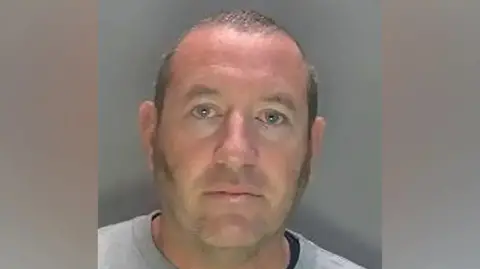 Hertfordshire Police
Hertfordshire PoliceSerial rapist and former Metropolitan Police officer David Carrick has been found guilty of sexually abusing a 12-year-old girl and a former partner.
The 50-year-old, who has already been jailed for life, has been convicted of molesting the girl in the late-1990s and raping the woman during a relationship more than 20 years later.
Jurors at the Old Bailey found him guilty of nine offences.
Carrick, from Stevenage, is already serving a minimum term of 32 years in prison, having admitted 71 offences of sexual violence committed over a 17-year period.
He is due to be sentenced this afternoon. The court has risen for a short break.
Carrick, wearing a suit and tie, shook his head repeatedly in the dock as the verdicts were read out.
The jury found him unanimously guilty of the following offences:
This breaking news story is being updated and more details will be published shortly. Please refresh the page for the fullest version.
You can receive Breaking News on a smartphone or tablet via the BBC News App. You can also follow @BBCBreaking on X to get the latest alerts.

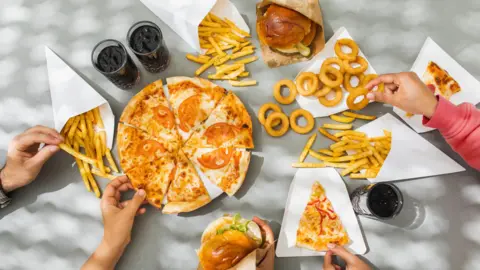 Getty Images
Getty ImagesAction is needed now to reduce ultra-processed food (UPF) in diets worldwide because of their threat to health, say international experts in a global review of research.
They say the way we eat is changing - with a move away from fresh, whole foods to cheap, highly-processed meals - which is increasing our risk of a range of chronic diseases, including obesity and depression.
Writing in The Lancet, the researchers say governments need "to step up" and introduce warnings and higher taxes on UPF products, to help fund access to more nutritious foods.
However some scientists say this review can not prove that UPFs directly cause health harms and more research and trials are needed to show that.

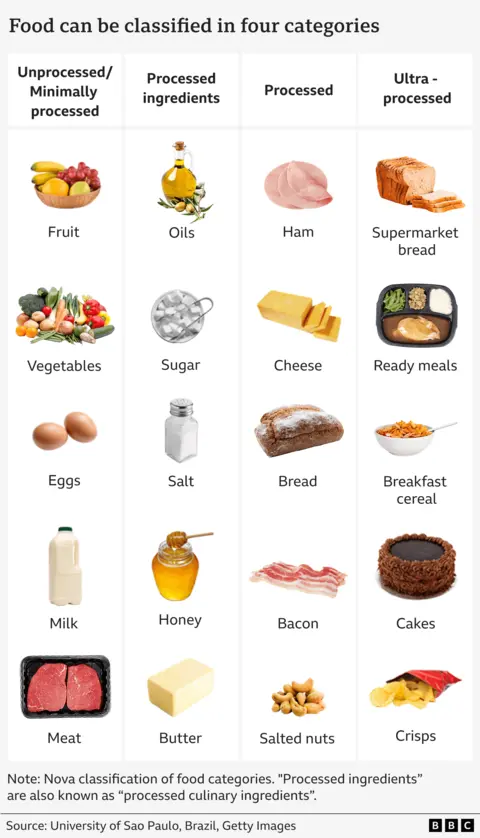
Ultra-processed foods are defined as containing more than five ingredients which you would not find at home in your kitchen cupboard, such as emulsifiers, preservatives, additives, dyes and sweeteners.
Examples of UPFs include sausages, crisps, pastries, biscuits, instant soups, fizzy drinks, ice cream and supermarket bread.
Surveys indicate these industrially-manufactured foods are on the rise in diets around the world, worsening the quality of what we eat with too much sugar and unhealthy fats and a lack of fibre and protein.
This review of evidence on the impact of UPFs on health, carried out by 43 global experts and based on 104 long-term studies, suggests these foods are linked to a greater risk of 12 health conditions.
These include type 2 diabetes, cardiovascular disease, kidney disease, depression and dying prematurely from any cause.
Review author Prof Carlos Monteiro, from the University of Sao Paulo in Brazil, who set up the Nova classification system for categorising food, said the growing consumption of ultra-processed foods "is reshaping diets worldwide, displacing fresh and minimally processed foods and meals".
"This change in what people eat is fuelled by powerful global corporations who generate huge profits by prioritising ultra-processed products, supported by extensive marketing and political lobbying to stop effective public health policies to support healthy eating," he added.
Co-author Dr Phillip Baker, from the University of Sydney, said the answer was "a strong global public health response - like the coordinated efforts to challenge the tobacco industry".
The review acknowledges a lack of clinical trials showing exactly how UPFs damage health - but says that should not delay action to protect people worldwide from potential health harms.

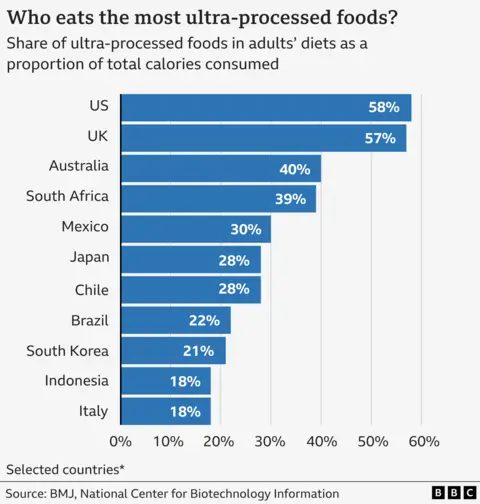
Some scientists have commented that it is difficult to untangle the effects of UPFs in people's diets from other factors in people's lives, such as lifestyle, behaviour and wealth.
Critics of the Nova classification system say it relies too much on the level of processing in foods, and not on how nutritious that particular food is. For example, wholegrain bread, breakfast cereals, low-fat yoghurts, baby formula milk and fish fingers all count as ultra-processed but have lots of good in them.
Prof Kevin McConway, emeritus professor of applied statistics at the Open University, said: "A study like this can find a correlation, but it can't be certain about cause and effect."
He said there was still "room for doubt and for clarification from further research".
"It seems to me likely that at least some UPFs could cause increases in the risk of some chronic diseases. But this certainly doesn't establish that all UPFs increase disease risk."
It is still not clear what it is about ultra-processed foods that could be causing or contributing to diseases.
Prof Jules Griffin, from the University of Aberdeen, said there were some positive sides to food processing, and more research to understand how it influences our health was "urgently needed".
The Food and Drink Federation says UPFs can form part of a balanced diet, like frozen peas and wholemeal bread.
"Companies have been making a series of changes over many years to make the food and drink we all buy healthier, in line with government guidelines," says Kate Halliwell, chief scientific officer at the Food and Drink Federation, which represents industry.
The amount of sugar and salt in products on sale in shops and supermarkets has gone down by a third since 2015, she added.
Current UK government advice on diet is to eat more fruit, vegetables and fibre, and cut back on sugar, fat and salt.
Conservative leader Kemi Badenoch has said the government's Budget is unravelling before it has even been delivered, after the chancellor backed away from raising income tax rates.
The government had given strong indications it was planning to increase the tax - which would break an election pledge - but last week government sources said Rachel Reeves had decided against the move after better-than-expected economic forecasts.
During Prime Minister's Questions, Badenoch pressed Sir Keir Starmer over whether the government would "break another promise" instead by freezing income tax thresholds.
The PM refused to rule this out, saying the chancellor would set out her plans in next week's Budget.
Describing the situation as a "shambles", Badenoch accused the government of floating the idea of increasing income tax rates only to "U-turn".
"This is the first Budget to unravel before it's even been delivered," she told the House of Commons.
"The chancellor's cluelessness, I'm afraid, is damaging the economy now."
Badenoch also highlighted comments from the chancellor in her Budget last year, when Reeves said: "I am keeping every single promise on tax that I made in our manifesto", and said she would not extend the freeze on income tax and National Insurance thresholds because this "would hurt working people".
The Tory leader asked the PM to confirm the government would not break this promise and continue the freeze on income tax thresholds.
But Sir Keir dodged the question, only saying the Budget would focus on cutting NHS waiting lists, debt and the cost-of-living.
"What we won't do is inflict austerity on the country as they did. What we won't do is inflict a borrowing spree like [Conservative prime minister] Liz Truss did," he added.
In response, Badenoch said it was "quite clear" the government was planning to freeze thresholds.
"If [the chancellor] breaks such a clear promise, how can the public trust a word that she says next week?"
Reeves will deliver her Budget in the House of Commons on 26 November, and Badenoch will give the immediate response for the opposition.
In Labour's 2024 general election manifesto, the party promised it would "not increase taxes on working people, which is why we will not increase National Insurance, the basic, higher or additional rates of income tax, or VAT".
The freeze on income tax thresholds was introduced under the Conservatives in April 2023 and is due to expire in 2028.
While an extension of the freeze would not break the strict letter of the manifesto promise, it would mean some people's tax bills go up.
This is because more people would be dragged into a higher tax band, or have to pay tax on their income for the first time, if they get a pay rise.
In the months running up to the Budget, ministers had repeatedly given strong indications that income tax rates would go up.
As recently as last week, Reeves had told the BBC sticking to Labour's manifesto commitments would require "deep cuts in capital spending".
In October, Sir Keir had declined to repeat his previous promises not to increase key taxes during Prime Minister's Questions.
However, last Friday it emerged that Reeves had decided not to go ahead with the move, after estimates suggested a gap in the public finances was £10bn smaller than previously thought.
Ahead of every Budget, the chancellor submits their plans to the Office for Budget Responsibility (OBR), which then make forecasts on whether the government will spend more money than it raises and whether the economy will grow or shrink.
A proposal to increase income tax rates by 2p, while cutting National Insurance by the same amount, was sent to the OBR as an option earlier this month to be costed, to help fill what was then a £30bn gap in the public finances.
Newer assessments from the OBR appear to have increased the projected strength of wages and tax receipts in the coming years and offset several billion pounds of that gap, taking it closer to £20bn.
Many Labour MPs were also nervous about breaking an election promise, which would have influenced the chancellor's decision.


Sign up for our Politics Essential newsletter to read top political analysis, gain insight from across the UK and stay up to speed with the big moments. It'll be delivered straight to your inbox every weekday.

 Getty Images
Getty ImagesWalking around your local supermarket and you'll struggle to find much that's healthy for your finances on the shelves - food price rises are accelerating.
The cost of the weekly shop is, and will continue to be, a worry for millions of people.
Beyond just food, prices of goods and services in general are going up, but the rate of those price rises have slowed.
And that is likely to bring better news for the cost of borrowing, in particular mortgage rates for homeowners and first-time buyers.
Prices pretty much always rise. Official statistics chart the movement in the cost of hundreds of goods and services in the UK.
It is the rate of increase that is crucial, and that inflation rate is published every month by the Office for National Statistics (ONS).
On Wednesday, the ONS said the rate of inflation had fallen to 3.6%, which means prices are rising more slowly than they were and will foster hope that inflation has peaked.

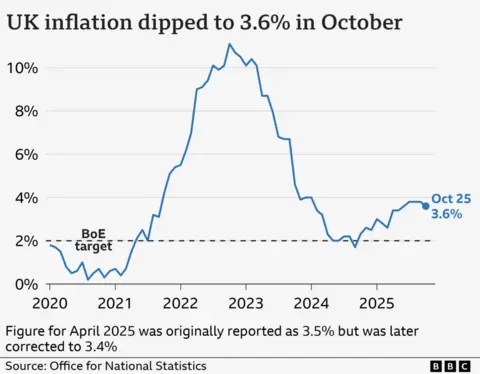
Delve a little further into the data, and there are more details about what is behind the latest trends.
For example, fish, vegetables, chocolate and confectionary were among the products that rose in price, although fruit prices fell slightly.
Recent research by the Bank of England found that people on average are still buying the same amount of food, but paying more for it. That said, they are changing the way they shop.
"Concerns about rising food costs and utility bills still dominate conversations," it said.
"Households continue to change their shopping habits to reduce spending, such as buying more vegetables and reducing meat consumption."

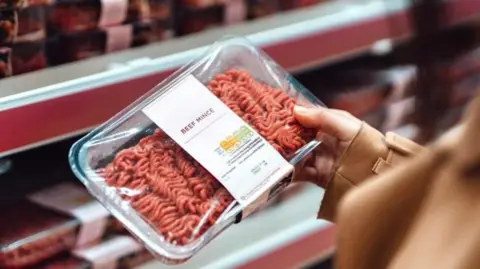 Getty Images
Getty Images"Staples like bread, meat and potatoes all cost more than they did even a month ago," says Danni Hewson, head of financial analysis at investment platform AJ Bell.
But she does point to a silver lining - the dip in the inflation rate means the Bank of England is now more likely to cut interest rates in December.
The Bank uses its benchmark interest rate - which heavily influences the cost of borrowing for households and businesses - to try to bring inflation to its target rate of 2%.
"Inflation remains well above the Band of England's happy place of 2%," says Alice Haine, personal finance analyst at Bestinvest.
But, she says, the latest figures could pave the way for a sixth interest rate cut since August last year.
The prospect of an interest rate cut has seen lenders make changes already. In recent weeks, many major lenders have lowered their rates for people getting a new fixed-rate mortgage or renewing their current one.
"There has been particular emphasis placed on rates for home movers with some of the best rates available for purchases," says David Hollingworth, of mortgage brokers L&C.
Data from the financial information service Moneyfacts shows that the average rate on a new two-year fixed deal has fallen to 4.88%, and is down to 4.93% for the average five-year fixed deal.
Average rates for those only able to put down a deposit of 5% or 10% - often first-time buyers - are now looking lower than they have been at any time in the last two or three years.
Inflation is only one factor in lenders' decisions to cut mortgage rates now.
Generally, Christmas is a quiet time for the housing market as potential buyers and sellers concentrate on turkey and trimmings instead.
So, they may be lowering rates in a bid to stimulate custom.
The same cannot be said for savings rates. "Competition has been scarce," says Caitlyn Eastell, from Moneyfacts.
That is compounded by the fact that many of those buyers, sellers and savers have put plans on hold until they find out what happens in the Budget delivered by Chancellor Rachel Reeves on 26 November.
The Budget looms large over the housing market, with talk of taxation on high value properties, as well as over economic activity in general.
Reeves wants to introduce measures to lower the rate of inflation, and help people with the cost of living. However, she also needs to bring in more money or cut government spending to meet her own fiscal rules.
It is a delicate balancing act that will affect individual and family finances, affecting the money people have to spend in the supermarket and the appetite they have to save, as well as buy or sell a home.

 Visit Isles of Scilly
Visit Isles of ScillyA British woman is among five people who have died in a snowstorm in Chilean Patagonia.
Victoria Bond, a public relations consultant from Cornwall, was named by authorities in Chile as among those killed in the tourist hotspot of Torres del Paine National Park, in the south of the country.
Along with Ms Bond, two German and two Mexican citizens died in the snowstorm, according to Jose Antonio Ruiz, the presidential delegate of the Magallanes region of southern Chile. Their bodies were found on Tuesday.
Visit Isles of Scilly chairman Andrew Sells said the organisation was "utterly devastated" by Ms Bond's death.
Visit Isles of Scilly said Ms Bond had headed up its public relations for more than six years and was on a "trip of lifetime" with friends in Argentina and Chile.
She was out hiking when she became trapped in the storm, the organisation said.
Mr Sells said she had "worked tirelessly" in her role to promote the islands, 28 miles off the Cornish coast, and was an "integral part" of the team.
He said: "She was always a joy to work with, and I cannot praise her work too highly. She is an enormous loss to the community."
Euan Rodger, executive vice-chairman of Visit Isles of Scilly, said the organisation was "heartbroken".
"She brought life, energy, and an infectious enthusiasm to every project, making her a true joy to work alongside," he said.
Adrian Jones, who worked with Ms Bond promoting the Roseland Festival in Cornwall, paid tribute to her as "lovable, witty and creative".
"She was a doer... she had ideas and she saw them through," he said.
"She will leave a huge hole in Portscatho... she lived in Newquay but she spent a lot of the time in Portscatho."
He described her as adventurous.
"Unbelievably sad as it may seem, she was doing what she lived life for," he said.
Chilean officials said the search for victims had ended and the focus was now on repatriating the bodies and liaising with foreign consulates.
Chilean President Gabriel Boric Font paid tribute to search and rescue teams who worked in "intense" snowfall and winds reaching speeds of up to 118mph (190km/h).
He said in a post on X: "To the families, friends, and loved ones of the five individuals of Mexican, German, and British nationalities who tragically lost their lives in the incident that occurred in Torres del Paine, I extend my deepest condolences.
"Know that you have the full support and collaboration of Chilean authorities and institutions during these difficult times."
The Foreign, Commonwealth and Development Office said: "We are supporting the family of a British woman who has died following an incident in Chile and are in contact with the local authorities."
Follow BBC Cornwall on X, Facebook and Instagram. Send your story ideas to spotlight@bbc.co.uk.

 @zinkevich_igor
@zinkevich_igorNine people have been killed in Russian strikes on Ukraine overnight, Ukraine's president Volodymyr Zelensky has said.
Russia launched more than 470 drones and 47 missiles in the "brazen attack", he wrote in a post on Telegram.
Three districts of Ukraine's second city, Kharkiv, were hit by a massive drone attack which injured more than 30 people, including children. Photos posted online showed buildings and cars ablaze.
Power cuts are affecting a number of regions across the country, Ukraine's energy ministry said.
This breaking news story is being updated and more details will be published shortly. Please refresh the page for the fullest version.
You can receive Breaking News on a smartphone or tablet via the BBC News App. You can also follow @BBCBreaking on X to get the latest alerts.

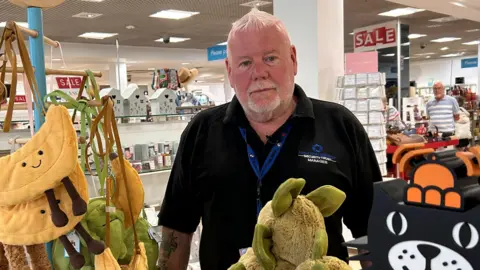 BBC
BBCThe time it takes to bring shoplifters to justice is "unacceptable" with retailers waiting longer for criminals to face punishment compared with a decade ago, the BBC has learned.
In one case, stores targeted by a thief waited up to 10 months for a shoplifter to be sentenced, despite retail workers piecing together her identity without help from the police.
Chelsea Strange, 33, went on a three-week crime spree stealing £2,000 worth of Jellycat soft toys from four different stores across the south west of England and one in Wales - which she later sold on Vinted.
Figures obtained by the BBC show the average time it takes for a shoplifting case to be dealt with from offence to completion in a magistrates' court in England and Wales has risen by more than 80% in the last 10 years – from 32 days in 2014 to 59 days in 2024.
Trade bodies representing retailers have said many stores have been left frustrated with the way shoplifters are dealt with. They say the time taken reduces shopkeepers' faith in the justice system - making them feel there's no point in reporting crimes.
"The delays in bringing perpetrators to court really does add insult to injury," said Andrew Goodacre, chief executive of the British Independent Retailers Association.
"It is no surprise many small shop owners simply do not bother reporting the crime in the first place. In their minds it makes no difference."
The BBC has looked at a series of shoplifting cases which highlight how shops have been left waiting months for thieves to be brought to justice.
We followed the Jellycat shoplifting case since December 2024, when we reported how a garden centre owner in Bridport, Dorset, had managed to piece together the thief's identity by scouring resale websites, deciphering her car's personalised number plate, and finding her Facebook profile.
Austins department store in Newton Abbot, Devon, was also targeted by Strange on three separate occasions – and staff said they too were able to figure out who she was.

 Austins Department Store
Austins Department StoreHead of security Tom Hirst described the time taken to deal with shoplifters as "unacceptable" and said the criminal justice system is "too easy on them".
"You're better off shoplifting than going to work, that's my honest view," he added.
"Every time someone comes in and steals something, that cost gets passed on… it puts the price up so we're all paying."
In July, Strange, from Felton, Bristol, was sentenced to a 12-month community order at Newton Abbot Magistrates Court after admitting stealing from five shops across Devon, Somerset, Dorset and South Wales in September and October last year.
She was also ordered to pay nearly £1,800 in compensation.
Strange's defence team said the offences were out of character and would not have taken place if it had not been for her poor mental health.

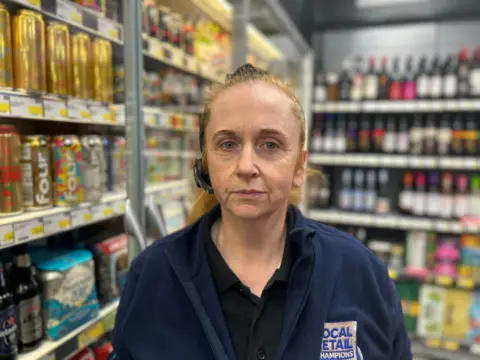
Fiona Malone, who runs a Post Office in Tenby, Pembrokeshire, also told the BBC she had to wait five months for a shoplifter who stole from her store to face sentencing – despite catching the thief red-handed.
The shopkeeper confronted Natalie Lintern after security cameras captured her stealing pre-mixed vodka cans, sandwiches and cake from the store in August last year.
Mrs Malone chased the 36-year-old down the street and got the stolen items back before reporting it to the police.
"The whole criminal justice system is too slow, it's bureaucratic," she told the BBC.
"We need to deal with these people and deal with them quickly and think about alternative punishments to stop them doing it in the first place."
In January, Lintern, from Pembroke, Pembrokeshire, was given a 12-month community order after pleading guilty to stealing from Tenby Post Office and four other stores between April and September 2024.
But the sentence did not stop her from shoplifting again.
Six months later, she was back in court again where she admitted stealing from a service station in May.
She was given six weeks in jail, suspended for 12 months.

 Tenby Stores and Post Office
Tenby Stores and Post Office"What we're doing as a society, it's not working," said Mrs Malone.
"It's like whatever punishment she got it was almost like 'Oh never mind I'll just go out and do it again'."
The most serious shop thefts can end up being heard at crown court where figures show the average time from the offence to cases being completed has increased from 111 days in 2016 to 128 days in 2024.
Shoplifter Bianca Mirica appeared in crown court after stealing more than £105,000 worth of goods from high street chain Boots between December 2023 and May 2024.
The 20-year-old, from Tottenham, London, was part of a shoplifting gang and would clear shelves of cosmetics and perfumes while another member of her team acted as look-out, according to police.
It took 14 months from her last theft before she was sentenced to 32 months in a young offenders' institution, after pleading guilty to 18 charges of theft.

 Met Police
Met PoliceShoplifting has increased by 13% in the last year with 529,994 shoplifting offences recorded by police in England and Wales up to June 2025, according to the Office for National Statistics (ONS).
However, the ONS said there are signs that increasing rates of shops thefts being reported are now slowing.
The crime adds an estimated £133 onto the cost of an average UK household's shopping bill each year, according to the Centre for Retail Research.
The government told the BBC it understood the "devastating impact" of shop theft on retailers and it was clear many cases were taking too long to be resolved, adding: "Justice delayed is justice denied."
It said it is backing the courts with record funding and considering recommendations for long term structural reform of the system.
The National Police Chiefs Council said it had strengthened its relationship with retailers and improved information sharing in the last two years - which had resulted in a number of offenders being brought to justice.
Assistant Chief Constable Alex Goss said it planned to bring together police, shops and the security industry to make best use of their resources and "turn the tide on the volume of offending blighting our communities".

 BBC
BBCGoogle's ultra-private CEO Sundar Pichai is showing me around Googleplex, its California headquarters. A walkway runs along the length of it, passing by a giant dinosaur skeleton, a beach volleyball pitch and dozens of Googlers lunching under the hazy November sun.
But it's a laboratory, hidden away at the back of the campus behind some trees, that he is most excited to show me.
This is where the invention that Google believes is its secret weapon is being developed.
Known as a Tensor Processing Unit (or TPU), it looks like an unassuming little chip but, says Mr Pichai, it will one day power every AI query that goes through Google. This makes it potentially one of the most important objects in the world economy right now.
"AI is the most profound technology humanity [has ever worked] on," he insists. "It has potential for extraordinary benefits - we will have to work through societal disruptions."
But the confusing question lingering over the AI hype is whether it is a bubble at risk of bursting - as, if so, it may well be a spectacular burst akin to the dotcom crash at the start of the century, with consequences for us all.

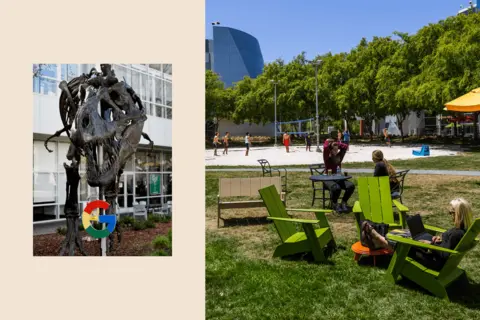 Bloomberg via Getty Images
Bloomberg via Getty ImagesThe Bank of England has already warned of a "sudden correction" in global financial markets, saying "market valuations appear stretched" for tech AI firms. Meanwhile. OpenAI boss Sam Altman has speculated that "there are many parts of AI that I think are kind of bubbly right now".
Asked whether Google would be immune from a potential bubble burst, Mr Pichai said it could weather that potential storm - but for all his starry-eyed excitement around the possibilities of AI, he also issued a warning: "I think no company is going to be immune, including us."
So why, then, is Google investing more than $90bn a year in the AI build-out, a three-fold increase in just four years, at the very moment these suggestions are being discussed?
The AI surge - of which Google is just one part - is, in cash terms, the biggest market boom the world has seen.
Its numbers are extraordinary - there is $15 trillion of market value at Google and four other tech giants whose headquarters are all within a short drive of one another.
Chipmaker turned AI systems pioneer Nvidia in Santa Clara is now worth more than $5 trillion. A 10-minute drive south, in Cupertino, is Apple HQ, hovering around $4 trillion; while 15 minutes west is $1.9 trillion Meta (previously Facebook). And in the centre of San Francisco, OpenAI was recently valued at $500bn.


The purely financial consequences of this trend are significant enough.
The value of the shares in these companies (and a few others outside Silicon Valley, such as Microsoft in Seattle) have helped cushion the US economy from the impact of trade wars, and kept retirement plans and investments buoyant - and not just in the US.
Yet it comes with a big risk. That is, the incredible dependence of US stock market growth on the performance of a handful of tech giants. The Magnificent 7 - Alphabet, Amazon, Apple, Meta, Microsoft, Nvidia, and Tesla - collectively comprise one third of the valuation of America's entire S&P 500.
And that market value is now more highly concentrated in a few firms than it was during the dotcom bubble in 1999, according to the IMF.
Mr Pichai points out that every decade or so come these "inflection points": the personal computer, then the internet in the late 1990s, followed by mobile and cloud. "Now it's clearly the era of Artificial Intelligence."
But as for the big question - is it a bubble?
Mr Pichai argues there are two ways of thinking about it. First, there is "palpably exciting" progress of services that people and companies are using.
But he concedes: "It's also true when we go through these investment cycles, there are moments we overshoot collectively as an industry…
"So I think it's both rational and there are elements of irrationality through a moment like this."

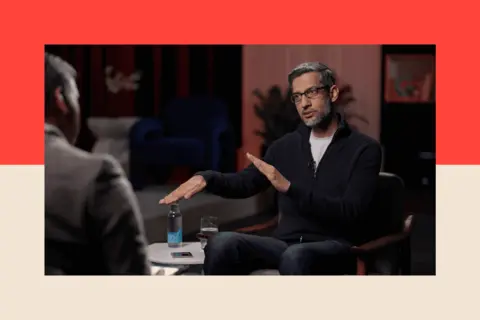
Now, a distinction is emerging in the markets between those businesses that rely on often borrowed money and complicated deals to access the chips that power their AI, and the biggest tech companies, such as Google, Microsoft and Amazon, which can fund investment in chips and data from their own pockets.
Which brings us to Google's own silicon chips, or their prized TPUs.
The lab, where they are tested, is the size of a five-a-side football pitch with a mesh of multi-coloured wires and deep blue blinking lights. Signs all around read: "restricted".
What's striking is the sheer noise - this is down to the cooling systems, which are needed to help control the temperature of the chips, which can get incredibly hot when crunching trillions of calculations.

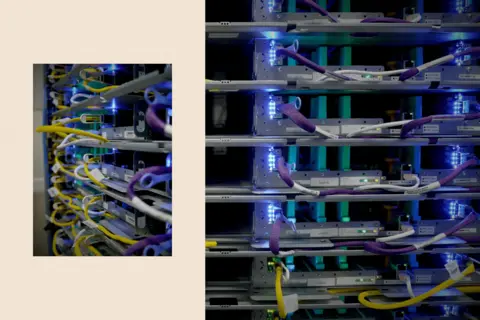
The TPUs are designed to help power AI machines. And they work differently from other types of chips.
The CPU (central processing unit) is the primary component of a computer - essentially its brain - that performs most of the processing and control functions, while GPUs (graphics processing units) perform more specialised processing, executing many parallel tasks at once - this can include AI.
However Asics (application-specific integrated circuits), are chips custom-built for a specific purpose, for example, a specific AI algorithm. And the TPU is a specialist Google-designed type of Asic.

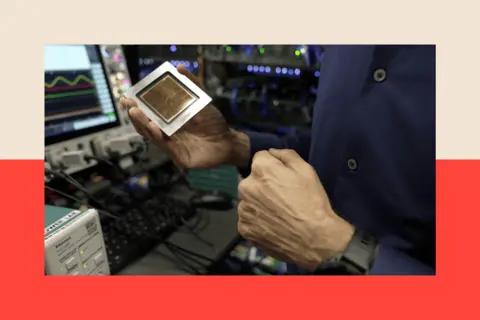
A core aspect of the AI boom has been the mad dash to amass lots of top-performing chips and put them into data centres (or the physical facilities that store, process and run large amounts of data and software).
Nvidia's boss Jensen Huang once coined the term "AI factories" to describe the massive data centres full of pods and racks of super chips, connected to huge energy and cooling systems.
(Tech bosses such as Mark Zuckerberg have referred to some being the size of Manhattan. The Google TPU lab is somewhat more modest, testing out the technology for deployment elsewhere.)
Stories abound of tech bros begging chip makers for hundreds of thousands of these highly engineered pieces of silicon. Take the recent dinner at Nobu in Palo Alto, where Elon Musk and Larry Ellison, the founder and head of Oracle, tried to woo Nvidia's Jensen Huang, to sell them more of them.
As Mr Ellison put it: "I would describe the dinner as me and Elon begging Jensen for GPUs. Please take our money - no, no take more. You're not taking enough. We need you to take more, please!"
It is precisely the race to access the power of as many as possible of these high performance chips, and to scale them up into massive data centres, that is driving an AI boom - and there's a perception that the only way to win is to keep spending.
The terrace of the Rosewood Sand Hill hotel, a sprawling 16-acre estate near the Santa Cruz mountains that serves crab rolls and $35 signature vodka martinis, is where the big Silicon Valley deal-making gets done. It's close to Stanford University and Meta's HQ, as well as the headquarters of major venture capital firms.
There are whispered rumours about who will be next to announce customised AI chips - Asics - to compete with Google and Nvidia.
Just before I visited, something of a storm was brewing about the investment plans of OpenAI, which Elon Musk co-founded.
The firm, which started as a not-for-profit but has since established a commercial structure, has been the focus of a web of cross-investments involving buying up chips and other computer hardware needed for AI processing.
Few in the industry doubt OpenAI's phenomenal user growth - in particular the popularity of its chatbot, ChatGPT. It has ambitions to design its own custom AI chips, but some have speculated about whether it might need government support to achieve this.

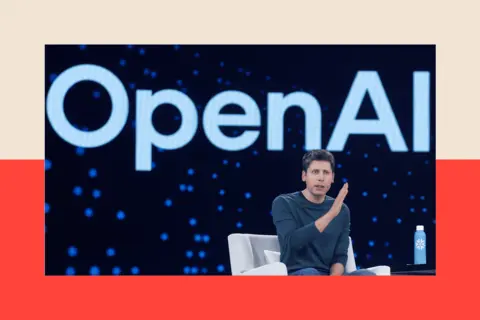 Getty Images
Getty ImagesIn a podcast episode that aired last month, an OpenAI investor questioned how the company's spending commitments tallied with its revenues, to which co-founder Sam Altman shot back, challenging the revenue figures quoted, and adding: "If you want to sell your shares, I'll find you a buyer. Enough."
He has since shared a lengthy post on X, explaining, among other things, that OpenAI is looking at commitments of about $1.4 trillion over the next eight years and why he believes now is the time to invest in scaling up their technology.
"I do not think the government should be writing insurance policies for AI companies," he said.
But he also said: "What we do think might make sense is governments building (and owning) their own AI infrastructure."

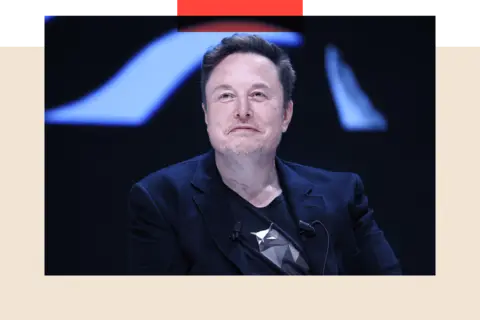 Getty Images
Getty ImagesElsewhere, there have been notable very recent falls in share prices of AI infrastructure companies - Coreweave, a start-up that supplies OpenAI, saw its shares lose 26% of their value earlier this month.
Plus, there have been some reactions in markets for perceived credit risk among other firms. And while most of these tech share prices have generally climbed higher over the course of 2025, there has been a mild dip more generally in the past few days.
None of this has dampened the excitement over AI's potential within the industry. Google's consumer AI model, Gemini 3.0, launched to great fanfare earlier this week — this will pitch Google in a direct battle with OpenAI and its still-dominant ChatGPT for the market share.
What we don't yet know is whether it marks an end to the days of chatbots going rogue and recommending glue as a pizza ingredient. So, is the end result of all this fantastic investment is that information is less reliable, I asked Mr Pichai.
"I think if you only construct systems standalone and you only rely on that, [that] would be true," he told me. "Which is why I think we have to make the information ecosystem has to be much richer than just having AI technology being the sole product in it."
But I put it to him that truth matters. His response: "truth matters".
Nor is the other big question facing tech today dampening the enthusiasm around advancing AI's potential. That is: how on Earth to power it?
By 2030, data centres around the world will use about as much electricity as India did in 2023, according to the IMF. Yet this is also an age where energy supply is under pressure by governments committing to climate change targets.
I put this to Google's Mr Pichai, asking if it is coherent to have ambitions to generate 95% of electricity from low-carbon sources by 2030 - as the UK government does - and also be an AI superpower?
"I think it's possible. But I think for every government, including the UK, it's important to figure out how to scale up infrastructure, including energy infrastructure.
"You don't want to constrain an economy based on energy," he adds. "I think that will have consequences."
Years ago, as a fledgling reporter I cut my teeth in the 2000 dotcom bubble. It followed a famous speech by Federal Reserve Governor Alan Greenspan about "irrational exuberance".
In that time I interviewed Steve Jobs twice, and a few years later questioned Mr Pichai's predecessor Larry Page, and commentated live on the collapse of WorldOfFruit.com.
Through it all, one lesson became clear: that even in the worst-case scenarios and the toughest of crashes, catastrophe isn't guaranteed for all.
Take Amazon - its share price slumped to $6 and its market capitalisation fell to $4bn during that crash, yet some 25 years on Jeff Bezos and his company are very much going strong. Today Amazon is worth $2.4 trillion.
The same would, inevitably, be true of companies shaken by a potential AI bubble burst.

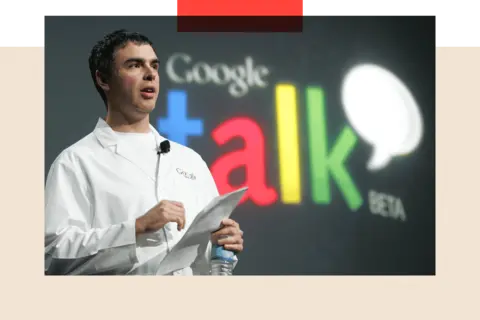 WireImage
WireImagePlus there is another looming factor that may well explain why so many in Silicon Valley - and beyond - are blind to, or perhaps choosing not to, acknowledge this risk, and pushing on regardless.
That is, the attraction of the glittering prize at the end: achieving artificial general intelligence (AGI).
This is the point at which machines match human intelligence, something many believe is within reach. Or beyond that, reaching artificial super-intelligence (ASI), the point at which machines surpass our intelligence.
But I was also told something else that was thought-provoking by a Silicon Valley figure - that it doesn't matter whether there really is a bubble or if it bursts. Step back and what is going on in the bigger picture is a global battle for AI supremacy, with the US against China taking centre stage.
And while Beijing funds these developments centrally, in the US it is a messy but productive free market free for all, which means trial and error on an epic scale.
For now, the US has superiority in silicon over China - companies like Nvidia with their GPUs and Google with their TPUs can afford to accelerate into the storm.
Others will surely fail, and spectacularly so, affecting markets, consumer sentiment and the world economy. The physical footprint left behind, however, containing sheer computing firepower for the deployment of mass AI technologies, will inevitably shape our economy and could well also shape how we work and learn - and who dominates the world for the rest of the 21st Century.


BBC InDepth is the home on the website and app for the best analysis, with fresh perspectives that challenge assumptions and deep reporting on the biggest issues of the day. You can now sign up for notifications that will alert you whenever an InDepth story is published - click here to find out how.

路透:美国证实向台湾出售价值近 7 亿美元的先进导弹系统,这款雷神公司的系统已在乌克兰接受过实战检验。这是10天内美国第二次宣布对台湾军售,总价已达10亿美元。
这是美国一周内向台湾出售的第二批武器,总额达 10 亿美元,华盛顿并重申了对台北的支持。
据中央社18日华盛顿报道:继美国国务院13日批准对台军售案后,美国战争部昨天宣布,雷神公司获总额约6亿9894万美元的合约,向台湾出售「国家先进地对空防空飞弹系统」(NASAMS)相关装备,预计完成日期为2031年,承办单位为美国陆军合约管理指挥部(U.S. Army Contracting Command)。
路透社说,乌克兰为抵御俄罗斯入侵而使用这款防空飞弹(NASAMS)系统显著增强了防空能力,随着该系统需求的增长,美国正将其出口至台湾。
在印太地区,目前只有澳大利亚和印度尼西亚在使用该系统。美国根据去年与台湾签订的20亿美元军售合同,将向台湾交付3套这种防空系统。
“坚如磐石”
美国驻台北事实上的大使雷蒙德·格林周二在美国商会台湾分会举办的活动中表示:“今天应该很清楚,而且未来也会保持清晰的是,美国对台湾的承诺是坚如磐石的。”
他补充说,我们正以实际行动践行这些承诺,重点支持台湾通过实力实现和平的努力。这一点在日益深化的国防工业合作中体现得最为明显。
周四美国批准向台湾出售价值3.3亿美元的战斗机及其他飞机零部件,这是自特朗普总统今年1月就任以来首次达成此类交易,引发台北方面感谢、北京方面愤怒。
此次军售消息传出之际,北京与东京围绕台湾问题的外交危机正不断恶化。中国宣称台湾是其领土,但台北当局拒绝承认北京的主权主张。
周日,中国海警船队驶入日本控制但中国主张主权的东海岛屿周边水域。
日本称,在中方无人机飞越台湾与日本最西端岛屿与那国岛之间空域后,日方周六已紧急出动战斗机。
当被问及周三的紧张局势时,台湾国防部长顾立雄表示,中国不应诉诸武力解决争端。
他告诉记者:“中国应放弃用武力解决问题的想法。”
台湾军方正通过建造自主潜艇等举措加强军备,以更好地应对来自中国的任何攻击,从而守护关键海上补给线。
中国军队几乎每日在台湾周边活动,台北方面认为这是中国采取的“灰色地带”战略,旨在测试和消耗台湾军力。
尽管双方没有正式外交关系,美国依其法律,有义务为台湾提供自卫手段,此举持续激怒北京当局。
有媒体爆出,江苏科技大学博士生导师郭伟涉嫌学历造假、学术造假,疑似只有高中学历。江苏科技大学回应称,郭伟已离职,当地警方介入调查。
综合《现代快报》、澎湃新闻等报道,在公开的新闻报道中,郭伟是江苏科技大学首席科学家、材料科学与工程学院教授、博士生导师。中国国家重大人才工程A类创新人才,德国洪堡青年学者,美国金属材料学会杰出科学家,2025年当选俄罗斯工程院外籍院士。
但经媒体查询,这份简历中的高考状元、研究成果、奖项、荣誉等多处明显与事实不符。有学生反映,郭伟实际只有高中学历,还涉嫌骗走大学600万元(116万新元)的经费。此事令不少网民感到诧异,“只有高中学历,居然能当博导”、“高校这么好骗的吗?”
江苏科技大学官方微博星期二(11月18日)通报称,在今年9月收到郭伟涉嫌学术不端的举报,对此高度重视,立即启动调查程序。经调查取证,认定郭伟存在严重学术不端行为,已经按规定解除了与郭伟的聘用协议,并对其团队师生进行了妥善安排。同时,学校第一时间向公安机关报案,目前案件正在侦办过程中。